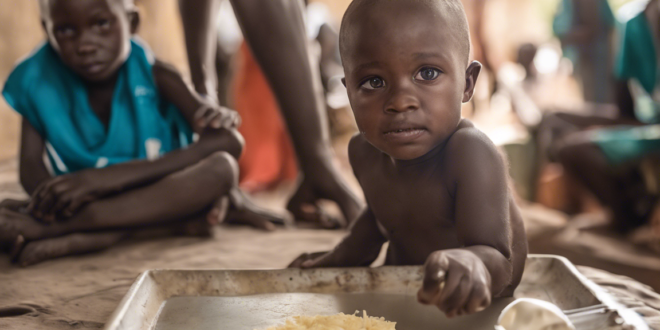Feeding Hope: How Médecins Sans Frontières is Transforming Child Nutrition in Nigeria’s Most Vulnerable Regions
In the harsh landscapes of northeastern Nigeria, where conflict and environmental challenges have left countless children on the brink of survival, a beacon of hope emerges through a groundbreaking nutritional intervention by Médecins Sans Frontières (MSF). This critical program is not just providing meals, but fundamentally reshaping the future for malnourished children in one of the world’s most challenging humanitarian contexts.
The Hidden Crisis of Child Malnutrition
Malnutrition remains a silent emergency in Nigeria, particularly in regions devastated by ongoing conflict with Boko Haram. The northeastern states of Borno, Adamawa, and Yobe have been especially hard-hit, with children bearing the most devastating consequences of prolonged food insecurity and displacement. Statistics paint a grim picture: nearly 1.8 million children under five are estimated to suffer from acute malnutrition, with approximately 500,000 facing severe, life-threatening conditions.
MSF’s Innovative Nutritional Intervention Strategy
The Médecins Sans Frontières nutrition project represents a comprehensive approach that goes beyond traditional food aid. By implementing integrated treatment centers and community-based interventions, the program targets multiple dimensions of child malnutrition. These centers provide not just nutrient-rich therapeutic foods but also comprehensive medical screenings, vaccinations, and critical healthcare support.
Understanding the Multifaceted Nature of Malnutrition
Malnutrition is not simply about hunger—it’s a complex health challenge involving nutritional deficiencies, compromised immune systems, and long-term developmental impacts. MSF’s approach recognizes this complexity, offering specialized nutritional treatments like Ready-to-Use Therapeutic Foods (RUTF) that provide concentrated nutrients enabling rapid recovery for severely malnourished children.
Community Engagement and Sustainable Solutions
A key innovation in MSF’s strategy is deep community involvement. Local health workers are trained to identify and treat malnutrition early, creating a sustainable model of healthcare delivery. By empowering community members, the program builds local capacity and ensures continued support even when international medical teams are not physically present.
Medical Technology Meets Humanitarian Aid
Advanced medical protocols are central to the nutrition intervention. Health workers use mid-upper arm circumference (MUAC) measurements and comprehensive health assessments to precisely diagnose and treat malnutrition. This data-driven approach ensures that limited resources are deployed most effectively, maximizing impact for children most at risk.
Overcoming Systemic Challenges
The nutrition project operates in an environment fraught with challenges. Ongoing regional conflicts, limited infrastructure, and widespread poverty create significant barriers to healthcare delivery. MSF has developed adaptive strategies, including mobile clinics, emergency medical teams, and robust supply chain management to ensure consistent nutritional support.
Impact Beyond Immediate Nutrition
The long-term implications of this nutritional intervention extend far beyond immediate food security. By preventing stunting and supporting early childhood development, MSF is investing in an entire generation’s potential. Children who receive proper nutrition during critical developmental stages are more likely to achieve better educational outcomes, experience improved cognitive function, and break cycles of poverty.
Global Context and Humanitarian Significance
While focused on northeastern Nigeria, this MSF project represents a broader model of humanitarian intervention. It demonstrates how targeted, scientifically-informed medical aid can transform lives in regions experiencing complex humanitarian emergencies. The approach offers valuable insights for addressing malnutrition globally, particularly in conflict-affected zones.
Personal Stories of Resilience
Behind the statistics are profound human stories of recovery and hope. Children who arrive at MSF centers severely malnourished often experience remarkable transformations. Medical records and testimonials from parents highlight not just physical recovery, but renewed hope and community strength.
How Americans Can Support the Mission
For compassionate Americans looking to make a difference, supporting organizations like Médecins Sans Frontières offers a tangible way to contribute. Financial donations, raising awareness, and advocating for global humanitarian initiatives can help sustain and expand critical nutrition programs.
Conclusion: A Continuing Journey of Hope
The MSF nutrition project in Nigeria represents more than a medical intervention—it’s a testament to human resilience and global solidarity. By providing malnourished children a fighting chance, these dedicated healthcare professionals are writing a narrative of hope, one child at a time.
As the world continues to grapple with humanitarian challenges, initiatives like this remind us of our shared responsibility to protect and nurture the most vulnerable among us. The journey continues, fueled by compassion, scientific expertise, and an unwavering commitment to human dignity.
 Good Calories Guide GoodCalories Guide focuses on nutrition, healthy eating, and overall wellness. The site offers practical insights into evidence-based dietary practices, including tips for specific lifestyles such as veganism, keto, and family-friendly meal planning. It also addresses unique nutritional needs for individuals with conditions like diabetes or food allergies, while providing quick and accessible recipes to make healthy living a sustainable and enjoyable choice.
Good Calories Guide GoodCalories Guide focuses on nutrition, healthy eating, and overall wellness. The site offers practical insights into evidence-based dietary practices, including tips for specific lifestyles such as veganism, keto, and family-friendly meal planning. It also addresses unique nutritional needs for individuals with conditions like diabetes or food allergies, while providing quick and accessible recipes to make healthy living a sustainable and enjoyable choice.


